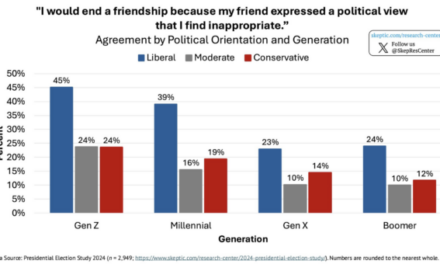We support our Publishers and Content Creators. You can view this story on their website by CLICKING HERE.
There is a lot of wailing and gnashing of teeth among Democrats, following Donald Trump’s unexpected (by them) victory. How could this possibly have happened? is the question newspapers, television hosts, and Democratic pundits are asking.
It actually isn’t a hard question to answer. The Biden/Harris administration had an indefensible record, and Kamala Harris didn’t seriously try to defend it, absurdly presenting herself as the candidate of change, while at the same time unable to identify a single respect in which her administration would be different from Biden’s.
Voters were unhappy about inflation, about the economy in general, and about the border. The Democrats, having created these problems, had no solutions to offer. Instead, they tried to tell voters that their concerns were imaginary.
Also, Kamala herself was a lousy candidate.
But the reality is worse than that. As the dust settles, I think Democrats will realize they are in a deeper hole than they thought. It was no coincidence that Harris refused to say what her position was on a variety of issues, earning the title of the “no comment” candidate–something that must be unprecedented in presidential history. The problem wasn’t that Kamala was tongue-tied, the problem was that the Democrats no longer have a coherent policy agenda.
The one issue that Harris never refrained from talking about was abortion. That is, today, the Democrats’ signature–and arguably only–issue. Apart from a fervent devotion to abortion, up to the moment of birth and beyond, what do they stand for?
A few years ago, the energy in the Democratic Party was in its socialist wing. Several of its seemingly up-and-coming representatives were members of the Democratic Socialists of America, and Bernie Sanders is the grand old man of socialism. On one memorable occasion, Nancy Pelosi was unable to explain how a Democrat is different from a socialist.
But the bloom is off that rose. Socialism was never a serious alternative for America; it is a discredited ideology that has been rejected around the world. And socialism is not a plausible ideology for a party whose core demographic is people who earn over $200,000 a year.
The Democrats are the party of DEI and Kamala Harris was a DEI candidate, but DEI is widely unpopular. The United States has labored under affirmative action, of which DEI is the current iteration, for 50 years. But Americans don’t like race discrimination or sex discrimination, and they believe in merit. An unbroken history of polling, stretching back for decades, has found that race and sex discrimination in employment and education are unpopular. Despite the massive corporate, government and cultural pressure that has tried to force DEI on Americans, that remains true. DEI, now on its way out, can hardly be the basis for future Democratic campaigns.
Opening the borders and admitting millions of illegal immigrants has been the core policy priority of the Biden administration, as reflected in Biden’s day-one executive orders. But it was a policy prescription that Democrats were never able to openly articulate and defend. Thus, as the 2024 election approached they were reduced to making the absurd claim that “the Southern border is secure.” Open borders are deeply and correctly unpopular, and do not provide a platform on which any future Democrat can run, although no doubt we will see plenty of tearjerking stories about illegals who are being deported.
The energy issue is analogous. Occasionally a Democrat will say publicly what the party really believes, that Americans live too well, and we must reduce our standard of living in order to emit less carbon dioxide. This view is manifested in efforts to suppress oil and gas production and subsidize and mandate expensive renewables. But the Democrats can’t admit that their goal is to make gasoline unaffordable, so when elections roll around they release the strategic petroleum reserve to drive the price down. The bottom line is that Democrats can yammer endlessly about the climate, but they can’t run on a platform of unaffordable energy.
The Democrats have always been the party of high taxes and unrestrained spending, ostensibly in pursuit of high-minded goals. But hardly anyone buys that anymore. Blue states are failing, without exception, and Americans are flocking to low-tax, low-spending red states–where they find that quality of life is better, not worse, than the states that spend vastly more on government programs.
Ever since the 1960s, the Democrats have been the party of peace (or, at least, anti-war). They have never repudiated the pacifism and borderline anti-Americanism of those days, and as recently as 2008, Barack Obama ascended from obscurity to a presidential nomination largely because he was almost the only prominent Democrat to oppose the Iraq war from the beginning. But now Republicans are running as a peace party, and it is Democrats who cling to international commitments and want to keep the Ukraine war, in particular, going.
Issues relating to war and peace are complicated, and the parties’ inclinations do not fall into a simple hawk/dove paradigm. But for the foreseeable future, Democratic Party platforms will not be based on opposition to foreign wars, nor will an “America last” ideology ever be a vote-getter.
So the Democrats’ problems go a lot deeper than a senile president and an inept candidate. At this point, the party’s historic policy agenda is in tatters and needs a complete reboot–something of which party leaders seem incapable.

 Conservative
Conservative  Search
Search Trending
Trending Current News
Current News 



